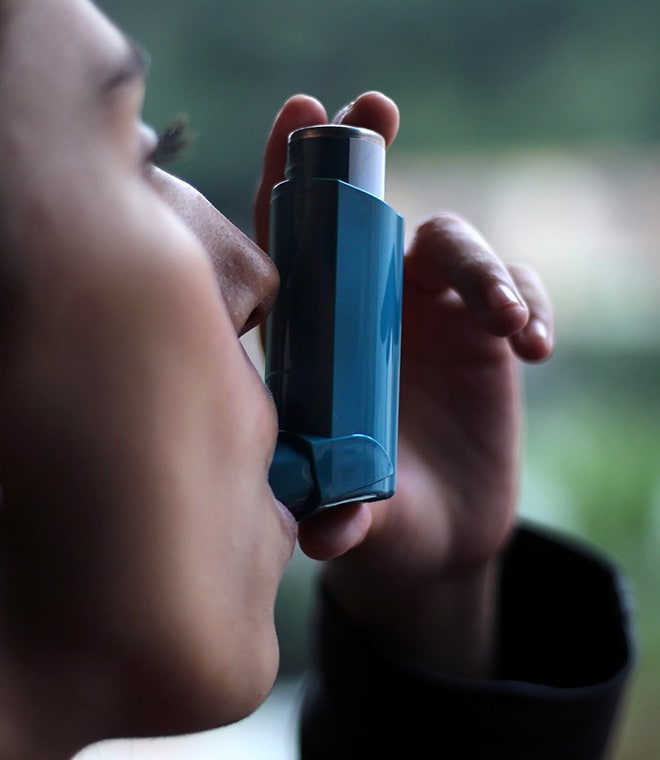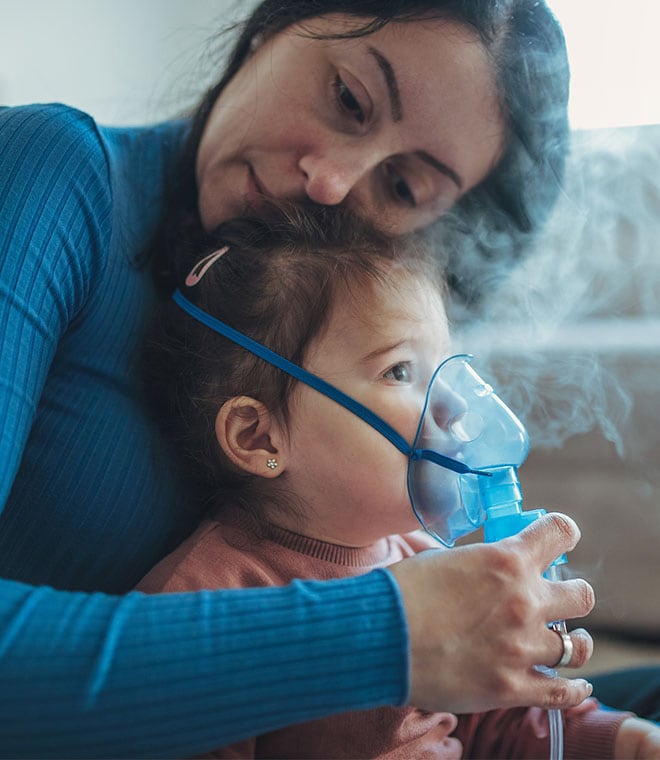Health
Coughing in asthma: What you need to know
By Sanjay “Jay” Patel, DO | Allergy & Immunology Jul 07, 2023 • 5 min
Shortness of breath, chest tightness and wheezing are the best-known symptoms of asthma. However, asthma can also cause coughing that interferes with daily activities and restful sleep.
Why does asthma cause a cough?
Coughing is part of the body’s natural response to irritants, as it can help clear mucus and other particulates from the airways. In some people who have asthma, the inflammation of the airways triggers the body’s cough response.
Asthma occurs when the airways become inflamed and/or constrict, or tighten. Swelling and/or constriction caused by asthma makes the airways smaller, so it’s more difficult for air to pass through.
A cough with asthma can occur along with other symptoms, or the cough may be the only sign of asthma. When coughing is the sole symptom of the condition, healthcare providers refer to it as cough-variant asthma.
How can I tell if a cough is from asthma?
If you have cough-variant asthma, it may be difficult to know whether the symptom is due to a respiratory condition or something else, like a cold. Wheezing along with a cough can be a strong indication that asthma is to blame. An asthma cough is usually a nonproductive, or “dry cough,” which means it doesn’t draw mucus up from the chest.
Because you may not be able to distinguish an asthma cough from a cough related to an illness, it’s generally best to see your healthcare provider for a diagnosis. They can conduct a physical examination and order tests, such as a chest X-ray, blood test, skin test or lung function test to determine if your cough is due to asthma.
How do you treat an asthma cough?
Typically, prescription medications are used to treat coughing due to asthma. Your healthcare provider may prescribe a fast-acting bronchodilator inhaler, such as albuterol, that widens the airways to quickly relieve symptoms. You may also be given a daily oral medication, or a controller medication or inhaler for daily use, to control inflammation.
Does over-the-counter cough medicine work for asthma?
If you have a cough from asthma, your first reaction may be to take over-the-counter cough syrup. Although these medications can temporarily relieve coughing due to colds and the flu, they’re unlikely to control an asthma cough. Furthermore, self-treating with over-the-counter options may “mask” symptoms and the full severity of your asthma, leaving you vulnerable to more serious attacks.
Tips for living with coughing due to asthma
There is no cure for asthma. However, a combination of self-care and medical treatments can help control symptoms, such as coughing. Following these tips can help improve your symptoms.
Identify and manage triggers
Asthma triggers are factors that can cause or worsen asthma coughing and other symptoms. They include cold air, exercise, air pollution, strong odors, stress and allergens, such as pollen and pet dander. Asthma occurs sometimes without external triggers. Attacks can also occur at random. Allergy testing can determine if you have allergic asthma, and keeping a symptom journal can help you identify other triggers.
Once you know what your asthma triggers are, take steps to avoid them or lessen their impact. For example, you may want to stay indoors on days when pollen counts are high if you suffer from seasonal allergies. You might also choose to wear a face mask when you go outside during the winter months if cold air leads to coughing.
Clean and maintain your home
Maintaining a clean home can reduce your exposure to many potential asthma triggers.
- Wipe off surfaces with a damp cloth to remove dust
- Clean soft and hard flooring often with a vacuum that has a high-efficiency particulate air (HEPA) filter
- Use a HEPA filter in your heating and cooling system, and change it as frequently as recommended to maintain high indoor air quality
- Use a HEPA air purifier in your bedroom to reduce the presence of fine particulates in the air you breathe while you sleep
Create an action plan
If you have asthma, you’re at risk for potentially dangerous and sudden flare-ups of symptoms, known as an asthma attack.
- Using a rescue inhaler as soon as possible can often stop asthma attacks, so plan ahead to ensure that you can access yours when you need it
- Keep your inhaler in a safe place at home and on the go, and tell family and friends where it is
- If symptoms don’t respond to the rescue inhaler, seek emergency medical attention, and make sure your loved ones know to call for help if necessary
- A healthcare provider who is certified to treat asthma should provide you with a written action plan that helps you understand how to treat your or your child’s asthma. The plan can be provided to loved ones or to the school nurse.
Partner with your healthcare provider
Your healthcare provider can help you better control your asthma symptoms. Ask about treatments that can help ease coughing associated with asthma. Your provider can also share tips on how to modify your home and your activities to reduce your exposure to triggers and lower your risk for asthma attacks.
Updated July 2023.
Sources:
- https://aafa.org/asthma/asthma-triggers-causes/allergic-asthma/
- https://my.clevelandclinic.org/health/diseases/21461-allergic-asthma
- https://mayoclinic.org/diseases-conditions/asthma/in-depth/allergies-and-asthma/art-20047458
- https://my.clevelandclinic.org/health/diseases/6424-asthma
- https://www.mayoclinic.org/diseases-conditions/asthma/symptoms-causes/syc-20369653
- https://medlineplus.gov/asthma.html
- https://acaai.org/asthma/symptoms/asthma-cough/
- https://www.nhlbi.nih.gov/health/asthma/symptoms
- https://www.epa.gov/asthma/what-asthma-symptom-episode-or-attack
- https://www.nhlbi.nih.gov/health/asthma
- https://acaai.org/allergies/management-treatment/living-with-allergies/air-filters/
- Curr Respir Med Rev. 2011;7(1):47-54. doi:10.2174/157339811794109327
- https://www.mayoclinic.org/diseases-conditions/childhood-asthma/symptoms-causes/syc-20351507



